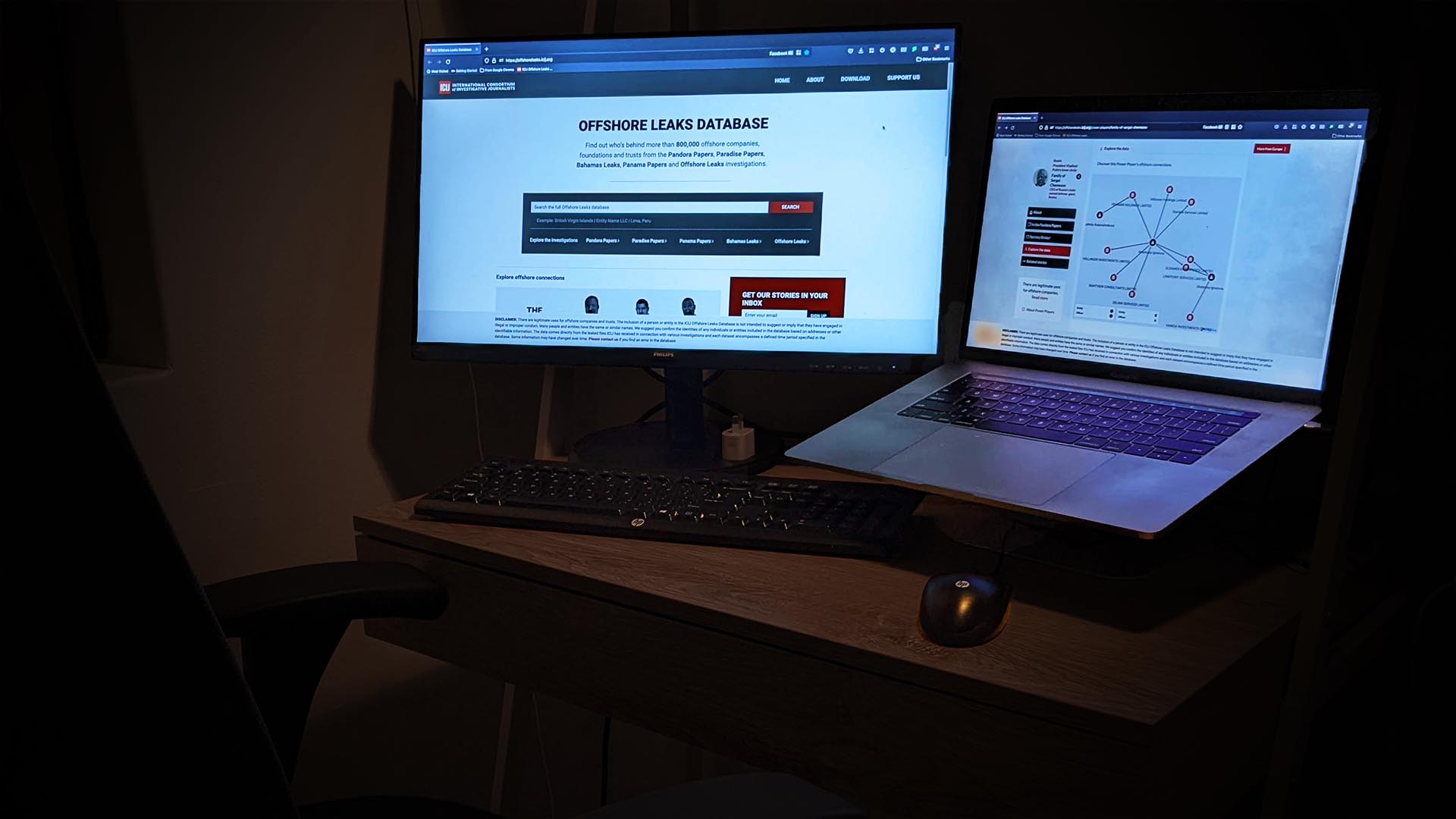The International Consortium of Investigative Journalists is adding a large volume of new information to its Offshore Leaks Database — incorporating additional data from the Pandora Papers investigation about beneficial owners, shareholders, directors and other types of officers from more than 9,000 offshore companies, foundations and trusts.
The new data comes from seven offshore providers headquartered in Hong Kong, Belize, the British Virgin Islands, Panama, Switzerland and Dubai.
They are Asiaciti Trust Asia Limited, CILTrust International, Commence Overseas Limited, IlShin, Overseas Management Company Inc, SFM Corporate Services and Trident Trust Company Limited. Sixteen current and former country leaders were connected to offshore entities that received services from these providers.
ICIJ believes that providing this data to all for free helps shine light on the offshore economy and, in many cases, the damage it causes. ICIJ is publishing this information in the public interest. There are legitimate uses for offshore companies, trusts and foundations; the presence of a person’s or a company’s name is not intended to suggest or imply that they have engaged in illegal or improper conduct.
As with previous sets of leaked data, ICIJ is not publishing raw documents or personal information en masse. The Offshore Leaks database contains a great deal of structured information about company owners, proxies and intermediaries in secrecy jurisdictions, but it doesn’t disclose private communications, bank accounts information, passports and other identification documents.
With the addition of this data, the Offshore Leaks database now has information on more than 750,000 names of people and companies behind secret offshore structures with links to more than 200 countries and territories. In all, the Offshore Leaks database has data on more than 810,000 offshore entities from five different leaks: Pandora Papers, Paradise Papers, Bahamas Leaks, Panama Papers and Offshore Leaks.
In October 2021, ICIJ revealed as part of its Pandora Papers investigation that it had identified the secret deals and hidden assets of more than 330 politicians and high-level public officials in more than 90 countries and territories, including 35 current or former country leaders. An ICIJ analysis also found more than 45 Russian oligarchs using offshore entities. Some of the data explored for these analyzes is now available in the Offshore Leaks Database.
The Pandora Papers investigation, the largest-ever journalistic collaboration in history, was based on a trove of more than 11.9 million records from 14 offshore service providers that offer services to wealthy individuals, celebrities, criminals and multinationals worldwide. By using shell companies, trusts, foundations and other entities in low- or no-tax jurisdictions, providing little to no transparency, the service providers’ clients often concealed their identities from the public and sometimes from regulators.
The publication of the Pandora Papers triggered reactions around the world: governments promised tougher laws, convened public hearings and launched investigations. Other public officials were forced to answer questions about their own financial dealings, or the offshore maneuvers of people close to them. Watchdog groups clamored for more efforts to end the shadow financial system that covers up tax dodging and money laundering.
Russia, the United Kingdom, Argentina, China, Brazil, Ukraine and Venezuela are among the countries with the largest number of beneficial owners hidden behind offshore entities in the Pandora Papers.
The companies, foundations and trusts that are part of this new publication were registered between the 1970s and 2019 in secrecy jurisdictions such as the British Virgin Islands, Panama, Singapore, Seychelles, and Hong Kong, among others. More than 4,500 entities published with this new release are registered in the British Virgin Islands.
A significant part of the beneficial ownership information in the Pandora Papers, including the data being published today, comes from documents that some of the offshore services providers needed to compile for the British Virgin Islands’ beneficial ownership register (also known as “BOSS”), which BVI authorities established in the wake of ICIJ’s publication of the Panama Papers in 2016. This beneficial ownership information which ICIJ has now integrated into its Offshore Leaks database is especially important as it is not made available elsewhere to the public. Nearly half of all the providers in the Pandora Papers have provided services as registered agents in the British Virgin Islands — establishing companies for thousands of clients looking for anonymity.
The biggest portion of the Pandora Papers trove, more than 3.3 million records, came from a sole offshore service provider: Trident Trust. Trident Trust, with offices in the British Virgin Islands and operations in more than 20 jurisdictions, is one of the world’s largest offshore service providers. Questions about who owns Trident Trust went unanswered last year when ICIJ contacted the company.
According to an ICIJ analysis, nearly a third of all politicians and public officials identified in the Pandora Papers data were clients of Trident Trust, the provider with the second largest number of this type of clients in the data. Among these 97 politicians and officials are seven current and former country leaders, including Gabon’s president Ali Bongo, Qatar’s current ruler Tamim Al Thani and Haiti’s former Prime Minister Laurent Salvador Lamothe.
The Offshore Leaks Database now contains records on more than 1,500 offshore entities registered in the British Virgin Islands that got services from Trident Trust.
Trident Trust also provided services to U.S. trusts created from 2000 to 2019 that ICIJ identified during the Pandora Papers investigation. Out of 206 trusts, 43 were registered with Trident Trust’s local office in South Dakota. ICIJ’s data analysis shows that in total, the U.S. trusts in the Pandora Papers held assets worth more than $1 billion, including real estate in Florida, New York and Germany, and accounts with banks in Panama, Switzerland, Luxembourg, Puerto Rico, the Bahamas and elsewhere.
Along with the offshore entities associated with Trident Trust, another more than 7,000 entities linked to the other six providers in this data release are also now included in the Offshore Leaks database. Data associated with those six providers includes at least 71 politicians and high level public officials who used those entities. Among them are 10 current and former country leaders from Chile, Colombia, the Dominican Republic, Gabon, Honduras, Jordan, Paraguay, Peru and Qatar. One of them also got services from Trident Trust.
While the newly released data contains relevant information that was previously unavailable to the public, not every officer or significant individual featured in Pandora Papers reporting appears in the Offshore Leaks database. This is because information about ownership is often buried in emails, power-of-attorney letters and internal notes and cannot easily be extracted in a systematic manner.
ICIJ’s data and tech teams dedicated months to the structuring of the information that was identified as being important by the teams’ data journalists and developers as well as by reporters and media partners across the world. To extract information from the millions of records, ICIJ combined a series of methods that varied for each of the 14 offshore services providers. The team combined and standardized information coming from spreadsheets; used programming languages to automate data extraction and structure the information; and employed machine learning and other tools. The team also manually extracted details from handwritten or hard-to-read forms. After structuring the information, ICIJ staffers put the data through a rigorous fact-checking process that incorporated ICIJ’s bespoke data cleaning and validation tool, Prophecies.
Since December 2021, ICIJ has added more than 25,000 offshore entities records from the Pandora Papers to the Offshore Leaks database. They are explorable through the search engine and can be filtered by data sources, linked countries and registered jurisdictions filters, among other options. The data in the Offshore Leaks Database is also available for download for non-commercial purposes.
If you find any relevant information and would like to share any tips with ICIJ and the Pandora Papers journalists, you can contact ICIJ through a variety of platforms, including Signal, WhatsApp, Keybase and more.
Contributors: Caroline Desprat, Madeline O’Leary, Pierre Romera, Maxime Vanza, Antonio Cucho, Jesús Escudero, Mago Torres, Denise Hassanzade Ajiri, Sean McGoey, Hamish Boland-Rudder, Asraa Mustufa, Jorge González, Javier Ladrón de Guevara, Michael Hudson
__________________________________
The current version of the Offshore Leaks database released between December 6, 2021 and May 2, 2022 was built by ICIJ:
Developers: Caroline Desprat, Madeline O’Leary, Pierre Romera, Maxime Vanza
Database developer: Miguel Fiandor
Design: Antonio Cucho
Data reporters and researchers: Agustin Armendariz, Delphine Reuter, Jelena Cosic, Jesús Escudero, Karrie Kehoe, Mago Torres, Margot Williams, Denise Hassanzade Ajiri, Sean McGoey, Nicole Sadek
Data & research editor: Emilia Díaz-Struck
Chief technology officer: Pierre Romera
Online editor: Hamish Boland-Rudder
Digital editor: Asraa Mustufa
System administrators: Jorge González, Javier Ladrón de Guevara




